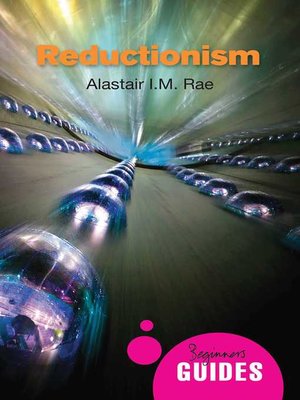
Sign up to save your library
With an OverDrive account, you can save your favorite libraries for at-a-glance information about availability. Find out more about OverDrive accounts.
Find this title in Libby, the library reading app by OverDrive.



Search for a digital library with this title
Title found at these libraries:
| Library Name | Distance |
|---|---|
| Loading... |
An unparalleled introduction to how the science of the small explains the biggest phenomena of life
From the atom to our societies, this is an unparalleled introduction to how the science of the small explains the biggest phenomena of life. Ever since the ancient Greeks conceived of the atom, humans have sought the smallest ingredients of existence. In the past century, the use of reductionism to understand behaviour has gained momentum as the quantum universe and the workings of the human mind have been uncovered in particle colliders and fMRI scanners.
Acclaimed physicist Alastair I.M. Rae spells out how the powerful tool of reductionism works, from the level of subatomic particles, up through molecular chemistry, and beyond to our neural networks. How does physics explain consciousness? Can quantum mechanics be applied to the brain or mind? What can economists learn from reductionism? Rae's exploration is an indispensable guide to one of the most fundamental ideas of science.
From the atom to our societies, this is an unparalleled introduction to how the science of the small explains the biggest phenomena of life. Ever since the ancient Greeks conceived of the atom, humans have sought the smallest ingredients of existence. In the past century, the use of reductionism to understand behaviour has gained momentum as the quantum universe and the workings of the human mind have been uncovered in particle colliders and fMRI scanners.
Acclaimed physicist Alastair I.M. Rae spells out how the powerful tool of reductionism works, from the level of subatomic particles, up through molecular chemistry, and beyond to our neural networks. How does physics explain consciousness? Can quantum mechanics be applied to the brain or mind? What can economists learn from reductionism? Rae's exploration is an indispensable guide to one of the most fundamental ideas of science.







